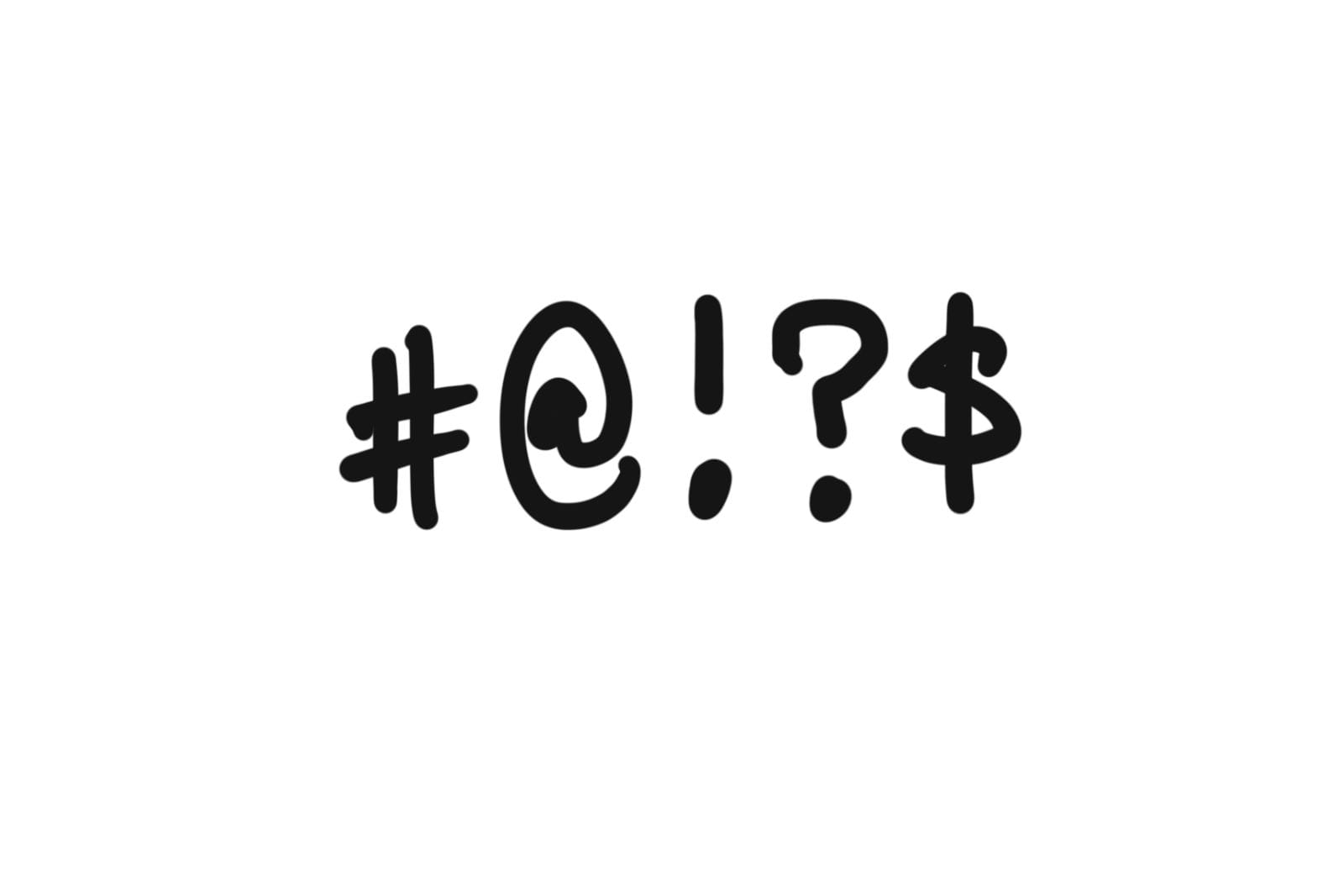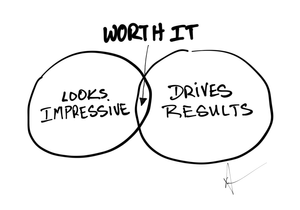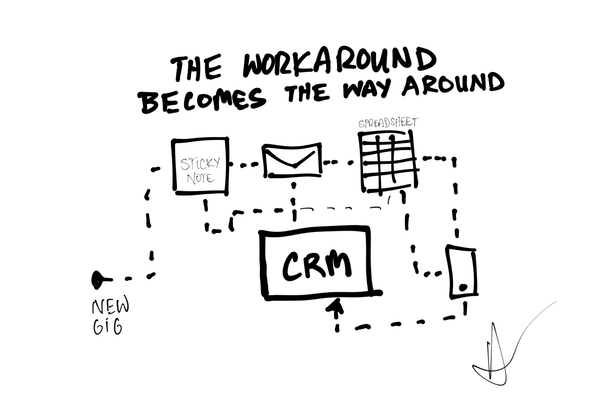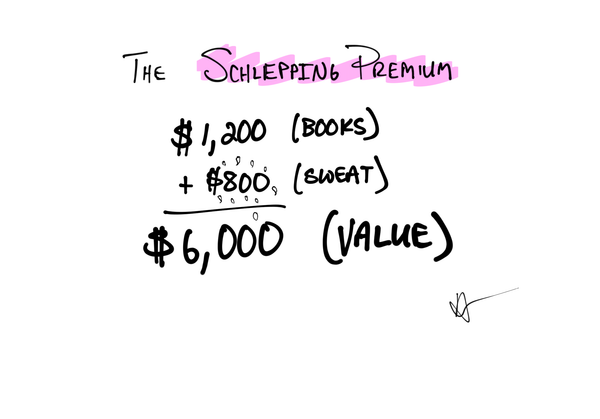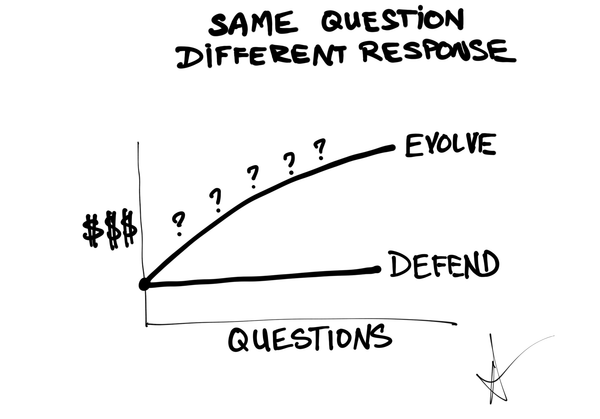Step into my time machine…
And let’s travel back to 2008 – where a younger Andrew Davis is passionately stomping his way across the stage at a contractor event.
Andrew is totally fired up.
Sweat glistens at his brow, and the bottom of his gray suit floats behind him as he moves quickly downstage.
His bowtie looks sharp.
His energy is infectious.
The audience is excited.
And things only get better when he starts to mix certain words into his speech…
$%@!.
And $&%@#.
And his personal favorite… %&*$(@.
Yes, my friends… it’s true.
I used to swear in my speeches… a lot, in fact!
So, what changed me from a cursing sailor to a G-rated gentleman?
Here’s the story…
The Swearing Years
A lot of people don’t know this…
…but I used to swear quite a bit on stage back in the 2008 to 2010 era.
At the time, Gary Vee was a pretty big deal. And people seemed to love it when Gary swore, so I figured I’d try it.
Plus, swearing showed that I was passionate. Some research even said it made a person appear more intelligent. I thought my bowtie and glasses did the trick, but some added swearing was sure to put me over the top.
So, did it make my speech better?
&@^* right it did!
The majority of the feedback I received from attendees was that my swearing and passion were downright infectious. They loved it.
I even had an event organizer tell me how the passion I expressed with my swearing was one of the main reasons they hired me. They made it very clear that when I spoke to their audiences, swearing was okay. (In fact, it was encouraged!)
Over time, this onstage swearing became part of my brand.
Meet “The Loud Few”
I used the audience feedback forms to take the room's temperature after my gigs. For the most part, the feedback was very positive.
If I had an audience of a hundred people commenting on my session, probably 95 of them would say how amazing I was. A few would even mention how much they loved the swearing.
But then, there was a small group of attendees – ones I call the “loud few” – at every event who would say how they were disgusted by my language.
My response?
I just dismissed them. They were grumps. They didn’t know how to have fun.
Most of the people loved me, so why should I change for a few folks who just didn’t get it?
My speaking career progressed steadily from 2008 to 2010 when I was invited to speak at a gig in Des Moines, Iowa.
That’s when everything changed…
This event will always stick out clearly in my mind. It was for a magazine publisher and the audience was filled with 800 magazines and their teams sitting at round tables.
After my usual introduction, I jogged on stage to begin my keynote. A few minutes into the speech, I dropped my first swear word.
No problem.
Things were going great. The audience loved my speech so far. A few minutes later, I swore again. I didn’t think twice.
Again, no problem.
About fifteen minutes into my keynote, I said my third curse word…
… and suddenly, an entire table of people stood up from their chairs.
They gathered their belongings, squeezed past the neighboring roundtables, and began to weave their way between other attendee chairs towards the back doors… and then completely out of the room.
Meanwhile, I watched helplessly from the stage while most of my audience twisted curiously in their seats to see the commotion.
It was horrible.
Turns out, the grand exodus was a team of publishers from a religious-related magazine. And they were deeply offended by my colorful choice of words.
After leaving the main room, this group of loud few went out into the hallway, angrily expressing their feelings to the event organizer. This was a professional event, and – to them – my swearing on stage was totally inappropriate.
Seeing their attendees in such a state, it was only natural for the event organizer to then approach me and share his own angry feelings – even though he had seen me speak before and knew I swore regularly.
Talk about a $(*!-show!
You can imagine the number of stageside leads and referrals I got from that gig.
Zilch.
From that day on, I SWORE I would never swear on stage again.
Is It Really Worth It?
We live in a day and age where the very loud few can hold sway over an entire event and its organizer.
The “loud few” is a term I use for a small but vocal group of individuals who passionately express their opinions or concerns. They stand out from the majority of the audience and can make a very emotional appeal to event organizers, planners, and executives when they see or hear something they don’t like.
That might not seem like a big deal until you think about how this can affect your reputation.
Every gig has the potential to earn you more gigs through referrals and stageside leads. But when you allow the loud few to find fault with your speech’s content, their negativity spreads throughout the audience like an infection.
Plus, there’s a good chance the loud few aren’t the only ones who found offense with your speech.
I used to dismiss the loud few when I saw their complaints on my feedback forms. I figured that their opinions didn’t matter that much since the majority seemed to like my speech.
But really, if the loud few are saying it, many others are probably thinking it too.
That’s why I stopped swearing on stage.
Is Swearing the Only Problem?
Turns out, swearing is just the tip of the iceberg. There are plenty of ways for you to deeply offend your audience.
If you’re a Premium Member, check out the second part of this article and I’ll take you through five different areas where the loud few can derail your speech.
Part two of this article covers:
- More rules you should follow religiously so you don’t awaken the loud few and derail your speaking career,
- How to respectfully respond and react to complaints,
- And a deeper look at how opinions from a small but vocal group can drastically affect your long-term success as a speaker.
Remember, the advice that got you here won’t get you there. It’s time for a massive move.
It’s time for a Monumental Shift.
Thanks for reading!
Andrew

